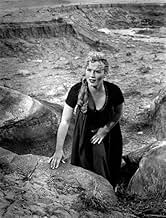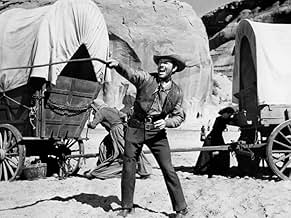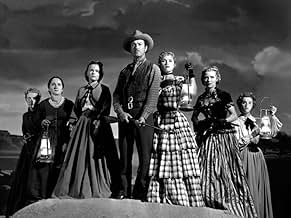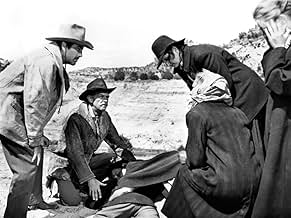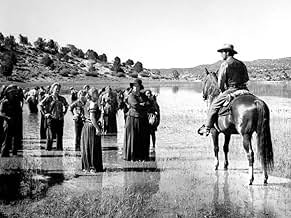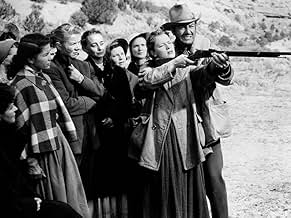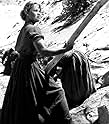NOTE IMDb
7,6/10
4,2 k
MA NOTE
Un guide de sentier escorte un groupe de femmes de Chicago à la Californie pour épouser des hommes qui ont récemment commencé à s'y installer.Un guide de sentier escorte un groupe de femmes de Chicago à la Californie pour épouser des hommes qui ont récemment commencé à s'y installer.Un guide de sentier escorte un groupe de femmes de Chicago à la Californie pour épouser des hommes qui ont récemment commencé à s'y installer.
- Réalisation
- Scénario
- Casting principal
- Récompenses
- 2 victoires au total
Claire Andre
- Pioneer Woman
- (non crédité)
Raymond Bond
- Preacher
- (non crédité)
Polly Burson
- Pioneer Woman
- (non crédité)
Archie Butler
- Outrider
- (non crédité)
Claire Carleton
- Flashy Woman
- (non crédité)
Bill Cartledge
- Outrider
- (non crédité)
Mary Casiday
- Pioneer Woman
- (non crédité)
Avis à la une
"Westward the Women" may not be the greatest western ever made but it's certainly one of the most unusual and is, indeed, very fine and I'm amazed it isn't better known. The women in question are 140 brides being brought West for for the male townsfolk in a Californian valley on a wagon-train lead by Robert Taylor. The director of the picture was William Wellman and William C. Mellor shot it in crisp black-and-white and it has a fine screenplay by Charles Schnee from a story by none other than Frank Capra.
As wagon-train movies go, it's not only unusual but remarkably robust and full of incident and it deals with the male/female dynamic with a surprising degree of honesty and if you don't think so, remember this was 1951. It's certainly not sentimental and Wellman approaches his subject with much the same documentary-like realism that John Ford brought to "Wagonmaster". In a good supporting cast Denise Darcel and Hope Emerson stand out.
As wagon-train movies go, it's not only unusual but remarkably robust and full of incident and it deals with the male/female dynamic with a surprising degree of honesty and if you don't think so, remember this was 1951. It's certainly not sentimental and Wellman approaches his subject with much the same documentary-like realism that John Ford brought to "Wagonmaster". In a good supporting cast Denise Darcel and Hope Emerson stand out.
John McIntire approaches wagonmaster Robert Taylor with an interesting job and challenge. He wants to bring brides west to the settlement he's founded in the southwest United States. Taylor hires on a bunch of hands to escort the women and issues a no fraternization policy. When one of them tries to rape one of them, he shoots him out of hand. It's the unsettled frontier and as wagonmaster he's the law on that train as much as a captain on a ship at sea. Of course the hands mutiny and strand Taylor, McIntire, cook Henry Nakamura and the women.
This was a perfect western film for the post Rosie the Riveter generation. No reason at all why women couldn't deal with the rigors of a wagon train. Of course it helped to have the formidable Hope Emerson along.
Of course men and women will be men and women and Taylor breaks his own no fraternization policy with Denise Darcel. Of course this is away from the train when Darcel runs off.
William Wellman delivers us a no frills unsentimental western with gritty performances by Robert Taylor and the rest of the cast. In a bow to his colleague John Ford, Wellman does have a courtship dance at the settlement. I liked the use of the fiddle music playing Believe Me With All Those Endearing Young Charms and Drink to Me Only With Thine Eyes. Ford couldn't have staged it better.
Henry Nakamura had made a big hit in MGM's Go For Broke about the Nisei division in Italy. He was a funny little guy, I'm not sure he was even five feet tall. I loved the scene when he and Taylor find a stash of buried liquor and proceed on a toot. This was his last film though, roles for oriental players were hard to come by. I wonder whatever happened to him.
If you like traditional cowboy films, this one ain't for you, but given the constraints of 19th century society for the role of woman Westward the Women is quite a revelation.
This was a perfect western film for the post Rosie the Riveter generation. No reason at all why women couldn't deal with the rigors of a wagon train. Of course it helped to have the formidable Hope Emerson along.
Of course men and women will be men and women and Taylor breaks his own no fraternization policy with Denise Darcel. Of course this is away from the train when Darcel runs off.
William Wellman delivers us a no frills unsentimental western with gritty performances by Robert Taylor and the rest of the cast. In a bow to his colleague John Ford, Wellman does have a courtship dance at the settlement. I liked the use of the fiddle music playing Believe Me With All Those Endearing Young Charms and Drink to Me Only With Thine Eyes. Ford couldn't have staged it better.
Henry Nakamura had made a big hit in MGM's Go For Broke about the Nisei division in Italy. He was a funny little guy, I'm not sure he was even five feet tall. I loved the scene when he and Taylor find a stash of buried liquor and proceed on a toot. This was his last film though, roles for oriental players were hard to come by. I wonder whatever happened to him.
If you like traditional cowboy films, this one ain't for you, but given the constraints of 19th century society for the role of woman Westward the Women is quite a revelation.
This western is gritty and realistic, and does not spare the audience from the grim facts of an overland trek from St. Louis to California with a wagon train of women (the "weaker" sex, right?
As far as I know, this movie has no rival in its subject matter, and the stars are magnificent. You will laugh and you will cry, but most of all, you will come away with a deep admiration of those hearty pioneers and especially those wonderful women. I have the video in my library!
As far as I know, this movie has no rival in its subject matter, and the stars are magnificent. You will laugh and you will cry, but most of all, you will come away with a deep admiration of those hearty pioneers and especially those wonderful women. I have the video in my library!
This is a William Wellmann's tour de force!In spite of the conventional macho Taylor,everything rings true ,this film has a smell of authenticity¨.Performances are so good (all the actors and mainly actresses) and nobody overacts .Sometimes it looks like a Russian movie,where the masses are the main hero.The fact that outside of English,THREE other languages are used (Italian,French and Japanese) shows Wellmann's respect for his audience.It's something to hear Denise Darcel sing "auprès de ma blonde " -a song from the seventeenth century- in the middle of the desert !
Some sequences are absolutely admirable ,I will mention three of them:
-the "recruitment" , the two women who hit the bull's-eyes (here a sheriff's eyes on a poster),the Italian family who registers without knowing what terrible fate lies in store for them (if they made a remake,I wonder what the politically correct world of 2004 would make of the little boy)
-After the attack,the women ,like in an army tell all the names of the dead.An echo adds to the poignancy of the situation.
-And last but not least,the survivors,who are still women,show their coquetterie and demand new clothes to meet their men.
Actually,it's the whole film which is in turn tragic,funny ,poetic,and wonderful.The gauche attitude of the men when they meet their future wives is a delight.
SPOILER:The key to the film is the birth of a child ,under the blistering sun of the desert;after the awful death of the little Italian boy,it gives hope back to the women and (to the audience).It' s the promise for them all that new children will soon be born and carry on their mammoth task.
A Russian western describes this remarkable work.
NB:Although French,Denise Darcel never made a movie in her native country.
Some sequences are absolutely admirable ,I will mention three of them:
-the "recruitment" , the two women who hit the bull's-eyes (here a sheriff's eyes on a poster),the Italian family who registers without knowing what terrible fate lies in store for them (if they made a remake,I wonder what the politically correct world of 2004 would make of the little boy)
-After the attack,the women ,like in an army tell all the names of the dead.An echo adds to the poignancy of the situation.
-And last but not least,the survivors,who are still women,show their coquetterie and demand new clothes to meet their men.
Actually,it's the whole film which is in turn tragic,funny ,poetic,and wonderful.The gauche attitude of the men when they meet their future wives is a delight.
SPOILER:The key to the film is the birth of a child ,under the blistering sun of the desert;after the awful death of the little Italian boy,it gives hope back to the women and (to the audience).It' s the promise for them all that new children will soon be born and carry on their mammoth task.
A Russian western describes this remarkable work.
NB:Although French,Denise Darcel never made a movie in her native country.
A brilliant slice of pioneer-era Americana. In no other movie that comes to mind was there such a realistic portrayal of the Old West and its numerous perils than in this faithfully told story of pioneer women crossing the harsh western U.S. wilderness of 1850 from Missouri to California.
The ladies are responding to an ad placed by a leader (on behalf of several other men) in a pioneer settlement out in California for wives. These tenderfoot ladies may be looking for husbands, but there's nothing "weak" about them at all. They not only bravely face the hardships, dangers, and tragedies of the journey, but they soon learn how to handle their own with toughness and grit.
The story unfolds clearly due to a finely structured and developed script. The intertwining stories are well told and well acted. The mostly female cast are all strong, and Robert Taylor as "Buck," the guide and leader of the wagon train seems to enjoy the task of having dozens of female leads surrounding him. John McIntyre as the patriarchal Mr. Whitman (who hires Buck) is good, while Buck's friend, confidant, and comic-relief guy Ito is also a well-rounded character.
The ending is one of the most heartwarming ever in a western; this is the kind of movie that can be watched over and over again.
The ladies are responding to an ad placed by a leader (on behalf of several other men) in a pioneer settlement out in California for wives. These tenderfoot ladies may be looking for husbands, but there's nothing "weak" about them at all. They not only bravely face the hardships, dangers, and tragedies of the journey, but they soon learn how to handle their own with toughness and grit.
The story unfolds clearly due to a finely structured and developed script. The intertwining stories are well told and well acted. The mostly female cast are all strong, and Robert Taylor as "Buck," the guide and leader of the wagon train seems to enjoy the task of having dozens of female leads surrounding him. John McIntyre as the patriarchal Mr. Whitman (who hires Buck) is good, while Buck's friend, confidant, and comic-relief guy Ito is also a well-rounded character.
The ending is one of the most heartwarming ever in a western; this is the kind of movie that can be watched over and over again.
Le saviez-vous
- AnecdotesWhen this film was broadcast on Spanish TV in 1985, in a remote mountain village near the French border where most of the inhabitants were male it inspired them to place an ad in some papers, requesting potential female partners from all over the country to come and marry the lonely country boys. As a result, a caravan of coaches loaded with dozens of young women from all over Spain turned up at the village for the blind date, and that day many of those lonely boys found the women of their lives.
- GaffesDuring a shooting lesson one of the men tells one of the women to "aim low that will make up for the recoil". When shooting a gun the bullet has long left the barrel, before the barrel begins to move in recoil. Aim low and you'll miss low.
- Citations
Patience Hawley: [to the awaiting bridegrooms] You can look us over, but don't think you're going to do the choosing! All the way from Independence, I've been staring at two things: one was this picture and the other was the rump of a mule... and don't ask me which was prettier!
- Crédits fousThe MGM lion, instead of roaring, is frozen in place.
- Versions alternativesAvalable in a colorized version on home video from Turner/MGM Home Video. Like many colorized versions of films, it was not authorized nor approved by anyone who worked on the film.
- ConnexionsFeatured in TCM Guest Programmer: Paul Aguirre (2007)
- Bandes originalesTo The West! To The West!
By Henry Russell
Meilleurs choix
Connectez-vous pour évaluer et suivre la liste de favoris afin de recevoir des recommandations personnalisées
- How long is Westward the Women?Alimenté par Alexa
Détails
- Date de sortie
- Pays d’origine
- Langues
- Aussi connu sous le nom de
- Caravana de mujeres
- Lieux de tournage
- Société de production
- Voir plus de crédits d'entreprise sur IMDbPro
Box-office
- Budget
- 2 203 000 $US (estimé)
- Durée
- 1h 58min(118 min)
- Couleur
- Rapport de forme
- 1.37 : 1
Contribuer à cette page
Suggérer une modification ou ajouter du contenu manquant


